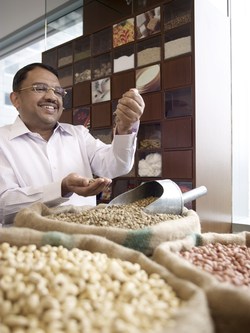HowWeMadeItInAfrica | 8 December 2011

Olam's CEO Sunny Verghese. Singapore-based Olam's recent farmland acquisitions include 300,000 ha for palm oil production in Gabon and around 26,000 ha for dairy in Uruguay.
by CLAUDE HARDING
Global agricultural company Olam says the cultivation and processing of rice in Nigeria has the potential to be a lucrative industry.
Nigerians consume around 5.5 million tonnes of rice annually, of which about 3.6 million tonnes is produced locally, mostly by subsistence farmers. The balance of 1.9 million tonnes is imported. The large size of the rice market in Nigeria, as well as the high duties and costs associated with importing the commodity, makes local production a fundamentally attractive industry. The Nigerian government has also introduced favourable incentives to boost local production.
It is because of this that Olam has decided to invest US$49.2 million to establish a 6,000 hectare irrigated paddy farming and rice milling project in Nigeria’s Nasarawa State. A paddy field is a flooded parcel of land used for growing rice.
At its peak, the project is expected to provide 60,000 tonnes of paddy annually to the processing facility, which would then be converted into 36,000 tonnes of milled rice. According to Olam, farming operations will start by the end of 2012.
“Globally, land under rice cultivation has remained stagnant around 150 million hectares over the last 30 years. With the growth in population not being accompanied by an increase in the area under cultivation, we have seen a lot of pressure in respect of global rice supplies with growing countries either banning exports altogether or increasing the support prices to farmers, thereby increasing the selling price of milled rice in the international market,” said Rajeev Raina, who looks after Olam’s rice business.
“Our investment into rice farming and processing in selective destination markets, while helping the importing countries in their import substitution efforts, would also help us to selectively get integrated in the value chain by participating in attractive and higher margin profit pools upstream in rice farming,” he added.

Olam's CEO Sunny Verghese. Singapore-based Olam's recent farmland acquisitions include 300,000 ha for palm oil production in Gabon and around 26,000 ha for dairy in Uruguay.
by CLAUDE HARDING
Global agricultural company Olam says the cultivation and processing of rice in Nigeria has the potential to be a lucrative industry.
Nigerians consume around 5.5 million tonnes of rice annually, of which about 3.6 million tonnes is produced locally, mostly by subsistence farmers. The balance of 1.9 million tonnes is imported. The large size of the rice market in Nigeria, as well as the high duties and costs associated with importing the commodity, makes local production a fundamentally attractive industry. The Nigerian government has also introduced favourable incentives to boost local production.
It is because of this that Olam has decided to invest US$49.2 million to establish a 6,000 hectare irrigated paddy farming and rice milling project in Nigeria’s Nasarawa State. A paddy field is a flooded parcel of land used for growing rice.
At its peak, the project is expected to provide 60,000 tonnes of paddy annually to the processing facility, which would then be converted into 36,000 tonnes of milled rice. According to Olam, farming operations will start by the end of 2012.
“Globally, land under rice cultivation has remained stagnant around 150 million hectares over the last 30 years. With the growth in population not being accompanied by an increase in the area under cultivation, we have seen a lot of pressure in respect of global rice supplies with growing countries either banning exports altogether or increasing the support prices to farmers, thereby increasing the selling price of milled rice in the international market,” said Rajeev Raina, who looks after Olam’s rice business.
“Our investment into rice farming and processing in selective destination markets, while helping the importing countries in their import substitution efforts, would also help us to selectively get integrated in the value chain by participating in attractive and higher margin profit pools upstream in rice farming,” he added.













